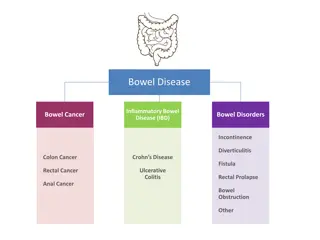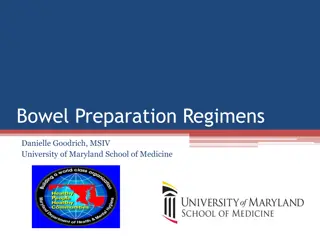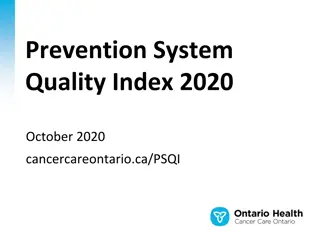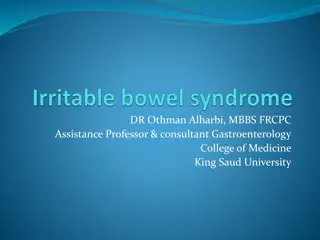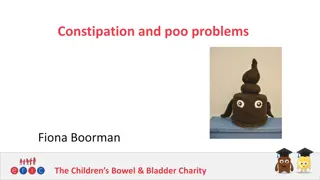Understanding Bowel Cancer: Facts, Prevention, and Awareness Efforts
Bowel cancer, also known as colorectal cancer, is a significant health concern, being the fourth most common cancer in the UK. It is essential to be aware of the symptoms, risk factors, and preventive measures associated with this condition. By maintaining a healthy diet, managing body weight, and staying physically active, individuals can reduce their risk of developing bowel cancer. Awareness campaigns, such as Bowel Cancer Awareness Month in April 2023, play a crucial role in educating the public about this disease.
Download Presentation

Please find below an Image/Link to download the presentation.
The content on the website is provided AS IS for your information and personal use only. It may not be sold, licensed, or shared on other websites without obtaining consent from the author. Download presentation by click this link. If you encounter any issues during the download, it is possible that the publisher has removed the file from their server.
E N D
Presentation Transcript
Bowel cancer awareness April 2023 Information taken from Bowel Cancer UK https://www.bowelcanceruk.org.uk/
Bowel cancer is also called colorectal cancer It affects the large bowel, which is made up of the colon and rectum. Most bowel cancers develop from pre-cancerous growths, called polyps. But not all polyps develop into cancer. If your doctor finds any polyps, he or she can remove them to prevent them becoming cancerous.
Facts and figures about bowel cancer Bowel cancer is the fourth most common cancer in the UK and the second biggest cancer killer. Nearly 43,000 people are diagnosed with bowel cancer every year in the UK. Around 268,000 people living in the UK today have been diagnosed with bowel cancer. 1 in 15 men and 1 in 18 women will be diagnosed with bowel cancer during their lifetime.
What else could it be? Constipation Diarrhoea Piles (haemorrhoids) Anal fissures Irritable bowel syndrome (IBS) Diverticular disease Crohn's disease Ulcerative colitis Image by Sketchfab.com
Reducing your risk Diet You can reduce your risk of bowel cancer by taking some simple steps to improve your diet Avoid processed meat and limit red meat Eat plenty of fibre from wholegrains, pulses, veg and fruit Be a healthy body weight
Be a healthy body weight Take action if you start to gain weight. As well as being physically active, here are a few tips to reduce your calorie intake if you need to lose weight. Be aware of portion sizes, don t overload your plate and avoid second helpings. Be wary of large or value-sized offers. Avoid sugary drinks such as cola, lemonade, fruit squash with added sugar and fruit juices (one small glass of fruit juice per day is enough). Alcohol is high in calories so limit the amount you drink. Watch out for extra calories from biscuits, cakes, sweets and crisps.
Physical activity People who are more physically active, have a lower risk of bowel cancer. You can be more active by: Taking the stairs instead of the lift or escalator Walking to the shops Doing the housework Walking the dog Getting off the bus a few stops earlier


